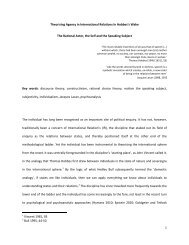sigmund freud's collection an archaeology of the mind
sigmund freud's collection an archaeology of the mind
sigmund freud's collection an archaeology of the mind
You also want an ePaper? Increase the reach of your titles
YUMPU automatically turns print PDFs into web optimized ePapers that Google loves.
knowledge, while its true concern resides in its<br />
relation to a knowledge that is not known.<br />
The value <strong>of</strong> <strong>the</strong> subject’s history in<br />
psycho<strong>an</strong>alysis is akin to <strong>the</strong> fact that <strong>the</strong>re is no<br />
time in <strong>the</strong> unconscious, a timelessness intrinsic to<br />
<strong>the</strong> structure <strong>of</strong> <strong>the</strong> unconscious, not made in time<br />
but with time. In this, <strong>the</strong>refore, it is similar to St<br />
Augustine’s proposal that God did not create <strong>the</strong><br />
world in time but with time.<br />
There is not a single area <strong>of</strong> knowledge that has<br />
not been touched by Freudi<strong>an</strong> psycho<strong>an</strong>alysis,<br />
whe<strong>the</strong>r accepting <strong>an</strong>d incorporating it, or<br />
rejecting it. It seems as if psycho<strong>an</strong>alysis situates<br />
itself as <strong>an</strong> almost m<strong>an</strong>datory reference point<br />
for modernity, from literature to ethnology, from<br />
philosophy to art, moving across <strong>the</strong> laws that<br />
structure society.<br />
In <strong>the</strong> aftermath <strong>of</strong> Freud’s progressive<br />
illness <strong>an</strong>d death, <strong>an</strong>d broadly speaking, from<br />
approximately <strong>the</strong> 1930s onwards, different<br />
currents within psycho<strong>an</strong>alysis appeared; to<br />
name <strong>the</strong> most import<strong>an</strong>t ones, Annafreudism,<br />
Kleini<strong>an</strong> Psycho<strong>an</strong>alysis, Ego Psychology, Object<br />
Relations, <strong>an</strong>d Self Psychology. All <strong>of</strong> <strong>the</strong>se<br />
groups, despite <strong>the</strong>ir differences with Freud,<br />
remain within <strong>the</strong> International Psycho<strong>an</strong>alytical<br />
Association <strong>an</strong>d, strictly speaking, do not depart<br />
from <strong>the</strong> main Freudi<strong>an</strong> tenets.<br />
In distinction, a paradigm took place with<br />
<strong>the</strong> <strong>the</strong>ses introduced by Jacques Lac<strong>an</strong>, who<br />
rigorously interrogated Freud in a novel m<strong>an</strong>ner to<br />
a point that eventually led to what we consider a<br />
discontinuity with Freud’s <strong>the</strong>ories. His teachings<br />
were heavily based in a singular reading,<br />
interpretation, <strong>an</strong>d tr<strong>an</strong>sformation <strong>of</strong> Freud’s<br />
works. After being expelled from <strong>the</strong> International<br />
Psycho<strong>an</strong>alytical Association, Lac<strong>an</strong> created<br />
his own school, L’école freudienne de Paris, a<br />
school that was as much outside from <strong>the</strong> IPA as<br />
from m<strong>an</strong>y <strong>of</strong> <strong>the</strong> tenets ascribed to Freud by <strong>the</strong><br />
groups mentioned above.<br />
After Lac<strong>an</strong>’s dissolution <strong>of</strong> L’école freudienne<br />
de Paris, <strong>an</strong>d since his death in 1981, <strong>the</strong><br />
fi eld <strong>of</strong> psycho<strong>an</strong>alysis has been dispersed in<br />
several currents, <strong>the</strong> majority <strong>of</strong> which claim<br />
to be Lac<strong>an</strong>i<strong>an</strong>, <strong>an</strong>d a number <strong>of</strong> new schools<br />
<strong>an</strong>d groups br<strong>an</strong>ched <strong>of</strong>f, mainly <strong>the</strong> Freudi<strong>an</strong>-<br />
Lac<strong>an</strong>i<strong>an</strong>s <strong>an</strong>d <strong>the</strong> Lac<strong>an</strong>i<strong>an</strong>s.<br />
Lac<strong>an</strong> told us in 1980 at <strong>the</strong> Caracas seminar;<br />
I am Freudi<strong>an</strong>, it is your turn if you w<strong>an</strong>t to be<br />
Lac<strong>an</strong>i<strong>an</strong>, although, as time moved on, <strong>the</strong><br />
factual propositions in his seminars increased <strong>the</strong><br />
difference with Freud. The rationale for this shift<br />
is that, as Freud himself acknowledged, ideas in<br />
fi elds <strong>of</strong> knowledge should not be identifi ed with<br />
eternal truths. This was much <strong>an</strong>ticipated by Freud<br />
himself distinguishing psycho<strong>an</strong>alysis both from a<br />
Welt<strong>an</strong>schauung <strong>an</strong>d from religion.<br />
Indisputably, however, Freud’s relev<strong>an</strong>ce to<br />
psycho<strong>an</strong>alysis today is demonstrated as <strong>the</strong><br />
necessary reference point for <strong>an</strong>y psycho<strong>an</strong>alyst<br />
as much as for <strong>the</strong> groups <strong>an</strong>d schools mentioned<br />
above. Paraphrasing Jorge Luis Borges’ defi nition<br />
<strong>of</strong> what a classic is; Freud is strictly speaking a<br />
classic, in that he is a continuous interlocutor<br />
<strong>of</strong> those fi elds <strong>an</strong>d <strong>of</strong> <strong>the</strong> contemporary, par<br />
excellence.<br />
It is in this context <strong>the</strong>refore, that we should<br />
perhaps ask, as <strong>the</strong> pertinent question, where<br />
is not to be found <strong>the</strong> relev<strong>an</strong>ce <strong>of</strong> Freud for<br />
psycho<strong>an</strong>alysis today?<br />
Trained in Buenos Aires, Argentina, María-Inés Rotmiler de<br />
Zentner <strong>an</strong>d Oscar Zentner are practising psycho<strong>an</strong>alysts in<br />
Melbourne. They introduced Jacques Lac<strong>an</strong> in Australia in 1977,<br />
founding The Freudi<strong>an</strong> School <strong>of</strong> Melbourne, <strong>the</strong> fi rst English<br />
speaking Lac<strong>an</strong>i<strong>an</strong> school <strong>of</strong> psycho<strong>an</strong>alysis, <strong>an</strong>d editing<br />
Papers <strong>of</strong> <strong>the</strong> Freudi<strong>an</strong> School <strong>of</strong> Melbourne, <strong>the</strong> fi rst<br />
Australi<strong>an</strong> psycho<strong>an</strong>alytic publication. Both resigned from<br />
The Freudi<strong>an</strong> School <strong>of</strong> Melbourne in 1992. Since <strong>the</strong>n <strong>the</strong>y are<br />
directors <strong>of</strong> Lituraterre - space for <strong>the</strong> articulation <strong>of</strong> <strong>the</strong><br />
psycho<strong>an</strong>alytic discourse.<br />
49

















